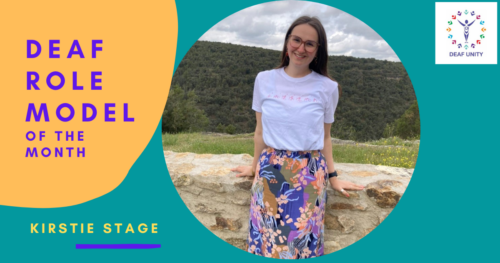
Each month we invite an inspirational or outstanding deaf role model to share their story. From what they’ve learnt, to what they wish they’d have known and their best deaf tips.
Our role model this month is Kirstie Stage. She’s a deaf researcher with a formidable academic record, and her work inside and outside of her research is truly interdisciplinary. Here we get to find out about her journey up until this point.
1. Please tell us a little about yourself?
Hello! My name is Kirstie. Whilst my academic training has primarily been in history, my work has been interdisciplinary, meaning that it often overlaps with politics, policy, sociology and law. For my research, I spend a lot of time visiting archives (for example, looking at old photographs, documents and sources); doing interviews about people’s experiences; reading; writing; and sharing what I have found. Outside of research, I love meeting people, exploring places, and setting new challenges. I have a black belt in kickboxing and have more recently found a love for both running and rowing!
2. Did you grow up in the Deaf Community or come to it later in life?
I have not grown up in the Deaf Community. Deaf clubs and signing spaces are so beautiful and important, and I’m so glad that I have been able to get more involved in the Deaf Community.
3. What was your experience of education as a deaf person?
I have always enjoyed learning. The right to education is something I care about and that I am grateful to have. I know that many people have not had access to education, so I appreciate the immense privilege that comes with it. Most of my friends at my secondary school didn’t go to university (I was the first woman to go to Oxbridge from my school and one of the few who has gone to Oxbridge altogether!) and my immediate family did not expect or put any pressure on me to go to university or pursue higher education. I have been lucky to have met some brilliant people along my academic journey so far, many of whom have shared really basic information about university life, for example how to apply for a degree, where to find funding, and how to write academic proposals.
I have met some incredible Deaf and disabled people in academia and made some of my closest friends throughout my time at different universities. I have been really lucky to travel across the UK (including Belfast, Liverpool, Manchester, Edinburgh amongst others!) as well as abroad (such as the United States of America and Poland!).
4. You have had an impressive academic career so far, beginning with a First Class degree in History and Politics from Queen Mary University. What was it that drew you to studying those subjects?
The reason why I am drawn to history is because I love people, and the stories, experiences, backgrounds and everything else that comes with it! I’m interested in understanding more about politics, society and change, which are all integral to cultural, social and political histories.
5. Your academic career has continued to flourish, receiving the Wellcome Trust Studentship for an MA in the History of Medicine at the University of Warwick and now studying for a PhD at Cambridge University. Throughout your studies you have focused on areas of disability and gender – what was it about these areas that were important to you? Why do you feel more research in these areas is needed?
From the start, gender has been an important analytic framework for me. When thinking about the Women’s Liberation Movement in Britain, I was surprised at how few historical works recognised disabled women’s contributions. Across different social movements, I noticed that Deaf and disabled women were largely overlooked and rendered invisible, which was frustrating when so many of them were involved in important historical events and belonged to different communities. This has inspired a lot of my research into disabled-led and Deaf-led organising. Whilst some great work has been done by organisations such as Deaf Rainbow and the Disabled People’s Archive (Greater Manchester Coalition of Disabled People), more research is needed to reflect on the richness of both the Deaf community and disabled community, not only with gender, but also class, sexuality, race, ethnicity, culture, language, social status amongst other important categories.
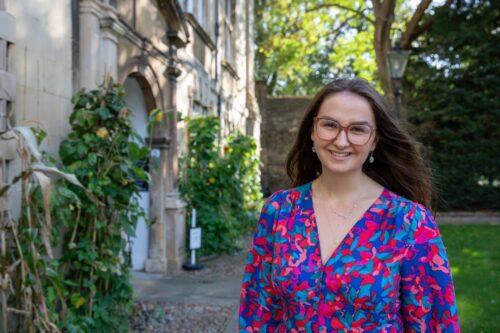
6. How have you found pursuing academia as a deaf woman? Have you encountered any challenges?
As a deaf woman, my experiences of education and academia have been complicated – sometimes I have been surprised at the thoughtful consideration of access (for example, supervisors checking in on me during the pandemic when all learning went online). At other times, I have been horrified at how people have spoken to me or had extremely low expectations of me. There are still considerable barriers in academia, both with access (for example BSL interpreters and notetakers), but also the additional workloads that Deaf and disabled people take onboard with little recognition. This means that I often spend a lot of my time advocating for myself or for others to have the same ability to participate as hearing or non-disabled colleagues. Workloads and additional processing time can also pose challenges within my academic work. Finding communities that I fit in with has been difficult at times. However, there are also so many positive things about academia too, including making some amazing friends, colleagues and mentors. Academia has opened up several opportunities to present my research to different audiences, travel, and work with some brilliant organisations and individuals.
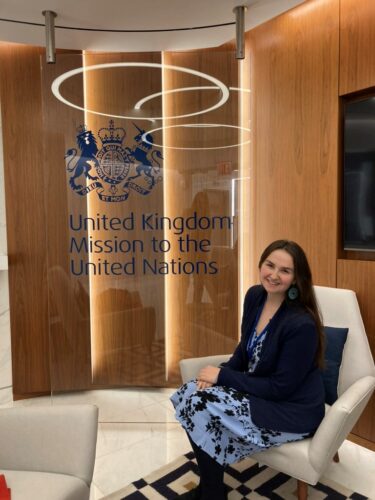
7. You’ve also worked as a Parliamentary Researcher, been selected as a UN Delegate for the Commission on the Status of Women, and worked closely with NGOs to investigate the intersection between gender and disability. What drives you to be so socially and politically engaged?
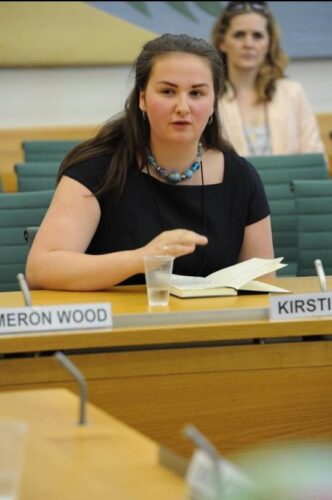
Social and political engagement looks different for each person. When I was a teenager, I felt strongly about support for people who had faced domestic abuse and provisions for young people in Salisbury and Wiltshire. I was encouraged to get involved with Youth Parliament and work with my local Council. This made me realise how much of a difference grassroots work can make to a local community. I’m now involved with deaf together, a campaign to end the inequalities all deaf people face. National and international work also matter too, for example with lobbying, legislation, engaging with different countries and pushing for more action in formal decision-making spaces, including United Nations processes.
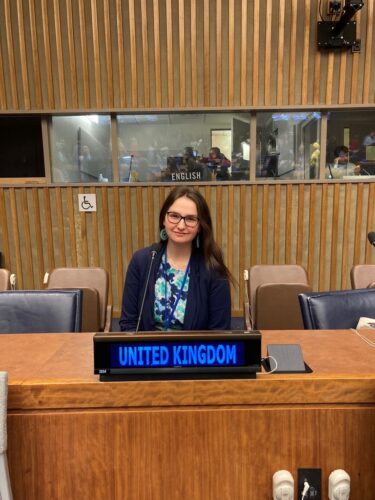
8. What other changes do you hope to see in the world of academia and the wider world in the next few years?
There has been a great trajectory of Deaf and disabled people who have been (and continue to work) in academia. I would love to see more Deaf and disabled students and academics. I am passionate about supporting organisations like Deaf Unity (where I am delighted to be a Trustee!) and the United Kingdom Deaf Students Union, as well as the UK Disability History and Heritage Hub that I helped to co-found in 2022. In the future, I hope that Deaf and disabled people do not have to advocate for themselves and do not have to always ask for access.
9. Who inspires you and why?
Three of my biggest inspirations within the Deaf community are:
Dorothy ‘Dot’ Miles was the most talented, creative and expressive poet. I remember watching some videos of her work and being absolutely captivated in how she signed so beautifully.
Maureen Jackson was the first Deaf woman I had properly met when I first visited the Manchester Deaf Centre. She was welcoming, kind and such an important force behind the British Deaf History Society, as well as a fantastic researcher, writer, archivist and historian.
Paddy Ladd has always been an absolute legend and someone I have looked up to, especially with his academic work and activism. His book, In Search of Deafhood, kickstarted my own exploration of Deaf identity and history.
10. What ways do you think hearing people can be allies to the deaf community? Any DOs and DON’Ts?
Never assume people’s communication preferences or needs! Deaf people aren’t aliens. We are not scary, so please don’t just ignore us. If you aren’t sure about something, ask (but please don’t tell us about your neighbour’s great-grandma’s relative who is deaf!).
Communication is two-way, think creatively if information is being missed (maybe write it down, use your phone, learn some basic BSL, repeat clearly, try rephrasing) but do not say ‘it doesn’t matter’. Small efforts make a huge difference.
11. 3 top tips for deaf people?
Don’t worry if we get something wrong! In almost every social interaction, I mishear someone’s name or talk about a different topic when I have misunderstood something.
Sometimes, things can be scary, and tasks can be overwhelming. Whilst I am the worst at following my own advice, try to look after yourself and take breaks (including hearing aid breaks, if you wear them!).
Being deaf is not something to be embarrassed about, even if it can feel like that sometimes. Find people around you who are supportive – sometimes you have to put yourself out there but surround yourself by people who know you and will check in on life’s ups and downs.
To read more inspirational role model interviews, take a look here. If you would like to be an ally to the deaf community and learn sign language, check out our courses here.
Looking for more support? We’ve made it our mission to improve the lives of deaf people everywhere. Check out Deaf Unity’s projects to find out what we can do for you. If you’d like to get in touch, contact us here.

